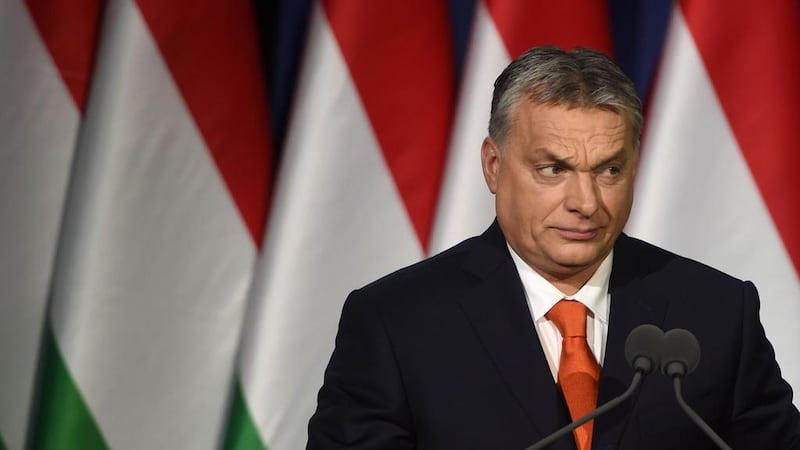Now that Xi Jingping is constitutionally allowed to remain China's president for life, he is effectively said to have become leader of the unfree world, one in which strongmen take charge without apology or anything so messy as free and fair elections. Is single-party China's surefooted rise on the world stage helping to put liberal democracy in retreat? The argument goes that the unfree world is expanding at an alarming rate and the Chinese template has more admirers by the day.
Hungary, which is soon to have an election, is a case in point. Prime Minister Viktor Orban, who is expected to win a fourth term, once cited China as a role model for the "illiberal state" he seeks to build. He is nearly there, having rewritten the constitution, dismantled checks and balances as an unsuitable "US invention", censored the press and intensified a xenophobic campaign against the coming "Muslim invasion".
Last month, Egypt and Russia had virtually uncontested national polls that served as affirmation-by-election for their incumbent presidents. Next year Turkey will hold local, national and presidential elections under skewed conditions that favour the increasingly autocratic president Recep Tayyip Erdogan and his Justice and Development Party. Israel and India also go to the polls in 2019 and the campaigns and results in both countries are likely to be to Mr Orban's taste in faraway Hungary. Benjamin Netanyahu's government has tried to disenfranchise the Arab population, which now outnumbers Jews throughout Israel. India's governing Hindu nationalist party has enabled vigilantes and stood by as law enforcement agencies and tax authorities target opposition politicians and media critics.
Clearly, even democratic countries with regular elections are veering towards inclusion in the unfree world, led by Mr Xi. Does that mean liberal democracy itself has failed as a project and most countries are doomed to oscillate, as they did until a couple of hundred years ago, between anarchy and various styles of tyranny?
The Economist Intelligence Unit’s Democracy Index offers a dispiriting diagnosis. In its 10th edition, published in January, the index indicated democracy is in declining health. A total of 89 of the 167 countries assessed last year received lower scores than the year before. Only 19 were found to be “full democracies” based on factors such as electoral process and pluralism, government functioning, political participation, democratic political culture and civil liberties.
The index backs the dirge for democracy, with academics increasingly using words such as “democratic recession”, “rollback” and “hollowing out”. But Kishore Mahbubani, dean of the Lee Kuan Yew School of Public Policy in Singapore, goes even further. Last year he suggested that “the global spread of democracy, a western gift to the world” was being replaced by “non-western attitudes” as American and European power recedes. His reasoning was simple. Democracy, he said, “was meant to result in the election of liberal, pro-western leaders”. Instead, it has allowed for the election of “a wave of strongmen rulers, many of whom have clear non-western identities”.
_______________________
Read more from Opinion:
[ Gavin Esler: America is great in every field except government ]
[ Jonathan Cook: With more Palestinians than Jews, Israel is waging a numerical war of attrition ]
_______________________
That sounds frightfully clever but is it true, especially when one considers Mr Orban and his fellow leaders on the so-called Visegrad Group of European countries – the Czech Republic, Poland and Slovakia? They too are veering towards authoritarianism but can hardly be said to have strictly non-western identities. And while it might be true to say Turkey's Islamist president Erdogan and India's Hindu nationalist Narendra Modi take anti-western positions, these are rooted in their people's lingering resentment of the West. By extrapolation, the Turkish and Indian leaders are being democratic in representing the will – however flawed – of their people. The tilt away from liberal democratic values should be seen for what it is, rather than a revolt against the West.
But that still doesn't explain the tilt, both East and West. Perhaps the best answer comes from Harvard political philosopher, professor Michael Sandel. He specialises in complicated subjects such as justice and is deeply interested in the greater common good. Prof Sandel argues that it wasn't only the hunger for jobs that drove US voters towards Donald Trump's strongman campaign promises and British voters to Brexit. It wasn't just a desire to get rich that led Italy to pick illiberal, populist, anti-immigrant parties last month. It was the search for justice, hardly a new preoccupation for humankind but especially frenzied in the second decade of this century.
This is because of the failure of politicians to remake the market economy model that resulted from Reagonomics and Thatchernomics into a fairer, more just social system. We went, Prof Sandel says, from being market economies to “market societies”, wholly soulless and valueless structures. Nationalism, with its emphasis on belonging and majoritarianism, is the result and it does not square with liberal democratic values such as human rights and civil liberties.
Democracy is not in retreat but in recess.





